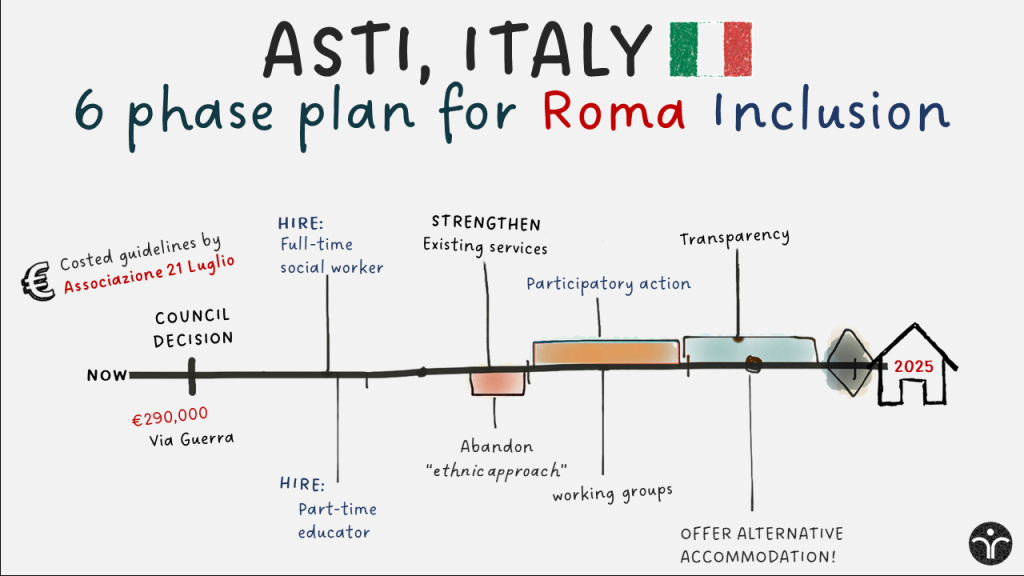Italy: Associazione 21 Luglio paving the way to overcome the system of the camps
07 November 2023

As reported in CRONACA, the NGO Associazione 21 Luglio has provided the authorities in the Piedmont town of Asti with costed guidelines for ‘overcoming the Roma camp’ in Via Guerra, which accommodates 62 adults and 83 minors, including several small children. Representing 21 Luglio, Carlo Stasolla stated that the plan, costed at €290,000, would comprise six phases over two years, and an operational team with a full-time social worker and part-time educator, would necessitate the abandonment of ‘the ethnic approach’ for a participatory action “that benefits everyone, with a strengthening of the already existing services."
The decision now lies with the ruling majority on the council. Councillor Mario Malandrone from the group Ambiente Asti, recalled how the minority on the council presented the draft proposal of 21 Luglio, which was welcomed by the Mayor, and set in train months of collaboration between the administration and the association. Now it remains for the project to become a reality. Malandrone called on the council to move forward on this issue and stated it was important to present the proposal publicly.
“to strengthen the alliance between minority and majority regarding how to deal with overcoming the Roma Camp; to give back to associations, groups and also to the city councillors, who participated in the working groups to draw up the project; for a question of transparency; to be able to share a choice, in the style that the majority and minority have adopted throughout the journey; to show the fruit of precious, voluntary, virtuous work that lasted months".
21 Luglio: The overcoming of the Collegno settlement ‘a case study for Europe’
In September 2023, 21 Luglio reported on the ‘overcoming’ of the Roma camp in the Turin municipality of Collegno. The intervention by the municipality was defined by two characteristics: the abandonment of an ethnic approach and the implementation of a participatory model, which saw the active involvement of the beneficiary families and various public and private actors. Following the intervention, all of the 70 people who left the settlement, were gradually placed in conventional housing, in some cases permanent, in others temporary.
21 Luglio has followed the plan closely since its inception and has identified it as a ‘case study’ for Europe that demonstrates “how in Italy the overcoming of mono-ethnic settlements is possible, where there is a clear willingness to carry out housing and work inclusion processes that affect families residing in marginalized areas.” They also noted that with this action promoted by the Administration of Collegno, there still remains “109 open-air settlements inhabited in Italy by approximately 12,000 Roma and Sinti.”
Such interventions come as good news in an era increasingly characterized by far-right nativism, shrinking space for civil society, and routine scapegoating of visible minorities. So grave was the situation in Italy that in 2019, the UN High Commissioner for Human Rights expressed concern about the increase in intolerance and racism, often encouraged by political leaders, and warned of the dangers of a situation were “hate speech has become normalised, and manifestations of hatred has become permissible.”
In such circumstances, the dogged determination of 21 Luglio, to promote a rights-based approach to Roma inclusion, combating all forms of discrimination, segregation and violation of human rights caused by local and national policies, is of vital import. In addition to policy recommendations to all concerned bodies, the organisation’s capacity to deliver costed, comprehensive and viable plans to the responsible authorities, and cultivate partnerships to overcome the system of the camps, is truly remarkable. Their promotion of participatory interventions to displace habits and practices of anti-Roma coercion, presenting ethical and pragmatic solutions to overcome supposedly intractable problems, serves as a reminder that there is a crack, a crack in everything – That’s how the light gets in.




